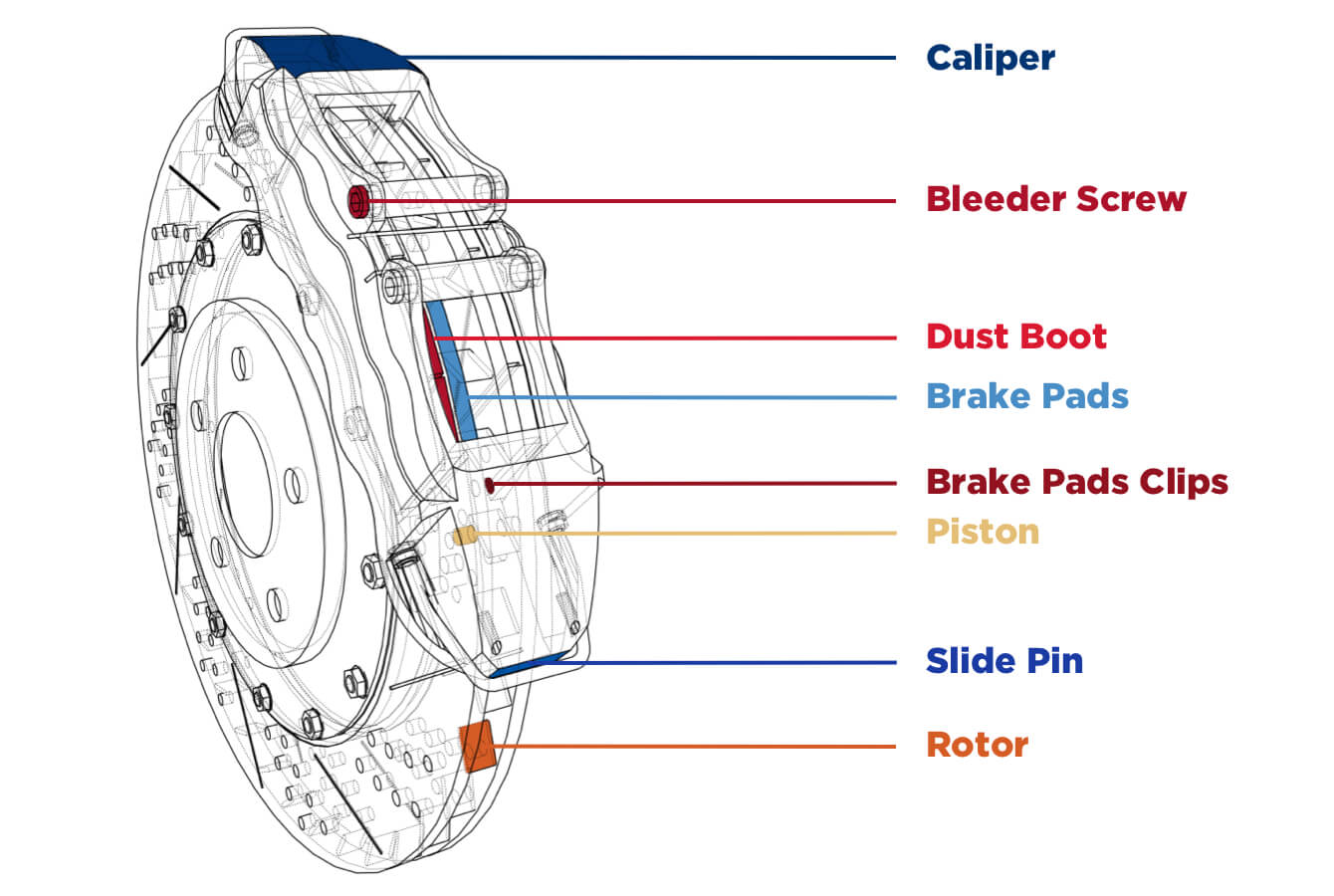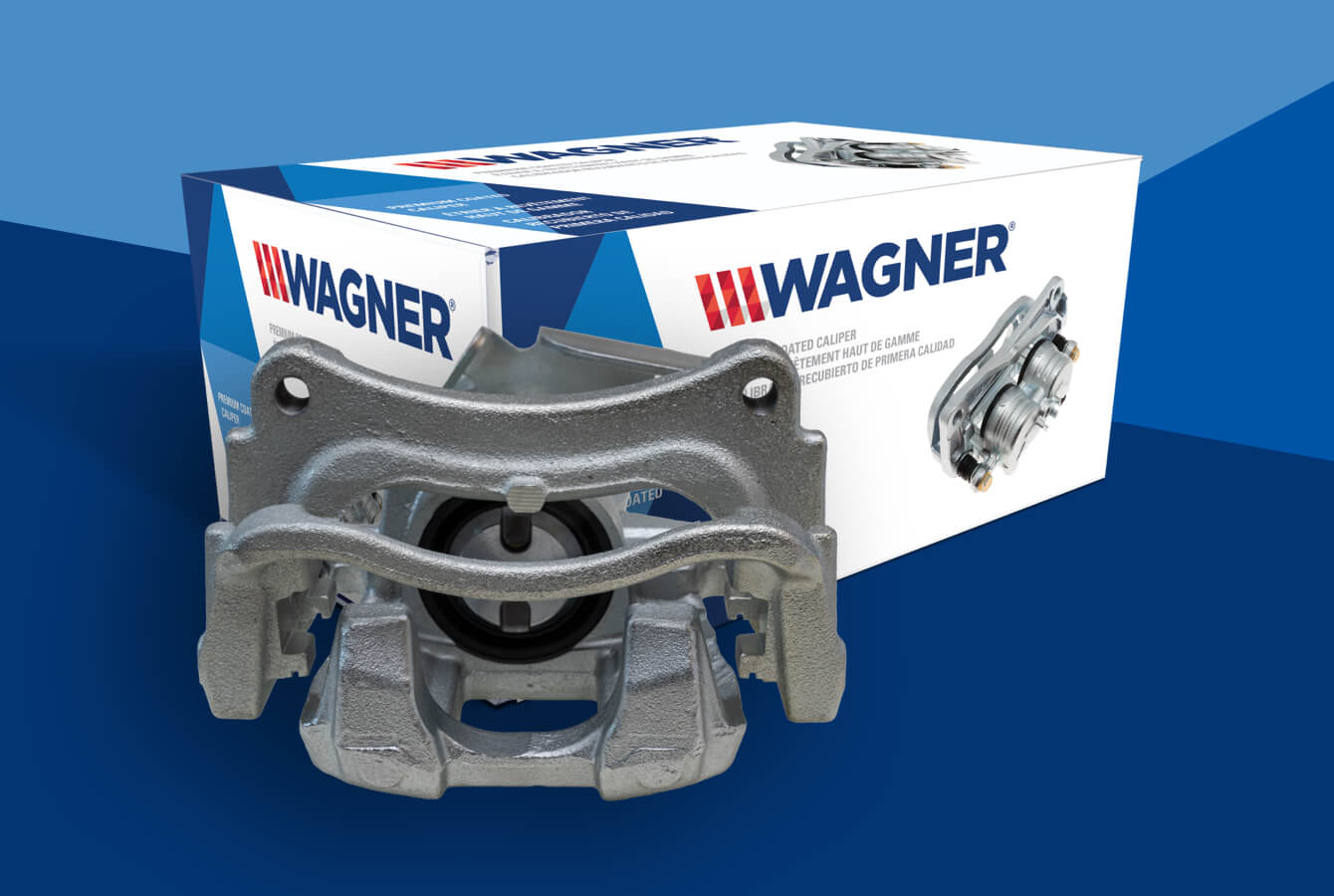Understanding Brake Calipers
A crucial part of a vehicle’s disc braking system, calipers clamp onto the rotor and house the brake pads and pistons. Brake calipers press the brake pads against the rotors which creates friction to slow down the vehicle and bring it to a stop.
What Are the Parts of a Brake Caliper?

Caliper Housing
Main body that houses the caliper’s components.
Piston
Cylinder-shaped component in the housing that presses the brake pads against the rotor when pushed out by brake fluid.
Brake Pads
Component made of high-friction material that is pressed against the rotor to slow or stop the vehicle.
Dust Boot
Ensures a secure seal around the piston; provides protection against leaks and other contaminants.
Brake Pad Clips
Holds the brake pads in the caliper.
Bleeder Screw
Releases air and excess brake fluid when the brakes are bled.
Slide Pin
Enables the caliper to slide on the bracket, which allows the caliper to slide against the bracket.
Rotor
Works with the brake pads to slow or stop the vehicle; friction is created as the brake pads are pushed against the rotor.
How Do Brake Calipers Work?

When you press down on the brake pedal, brake fluid is driven through the lines which forces a piston in the caliper to push the brake pads against the rotor. Brake calipers work with the other components of the braking system to bring the vehicle to a stop.
Signs Brake Calipers Should Be Replaced
Knowing if there is an issue with the brake calipers is key to ensuring the reliability of the braking system. If you notice any of these symptoms of bad calipers, it’s time to have your vehicle inspected by a technician for a diagnosis and repair.
Uneven Brake Pad Wear
If the caliper pistons aren’t applying even pressure, it can cause the brake pads to wear down more on one side than the other.Poor Braking Performance
A failing brake caliper can lead to the vehicle taking longer to stop and a reduction in overall braking performance.Dragging Brakes
A dragging sensation while braking can mean that the caliper is sticking, resulting in brake drag.Noises
Unusual noises like grinding, clunking or squealing can be the result of caliper issues like stuck pistons.Rust
Calipers that have become corroded can seize or leak causing them to fail.Shaking or Vibrations
Failing calipers put uneven pressure on the rotors while braking which can cause the vehicle to shake or vibrate.
What Causes Brake Calipers to Fail?
Depending on your driving habits and road conditions, brake calipers have a lifespan of 75,000 to 100,000 miles. Brake calipers fail due to four main reasons:
Corrosion
Moisture, road salt and dirt exposure can lead to the metal components on brake calipers to corrode, causing the pistons or calipers to seize and not function properly.Overheating
Braking generates a tremendous amount of heat which can damage the calipers’ seals and pistons.Damaged Seals
Harsh conditions and high temperatures can cause the seals to wear and deteriorate which can allow moisture or dirt to get into the system.Stuck Shims
If pieces of dirt or debris become lodged in the cracks of the calipers, it can impede the sliding action of the brake pads or can cause the brake pads to get stuck which can cause the brake pads to get stuck and not work properly.
What Happens if You Drive with Worn Calipers?
If you suspect there is a problem with the calipers, it is imperative that you have your vehicle examined by your technician. Driving with bad calipers results in reduced braking power and loss of vehicle control. You may experience:
Uneven Braking
A failing brake caliper may not apply the same amount of braking force to the brake as the other calipers which can cause the vehicle to pull to one side.Locked Up Brakes
A seized caliper can cause the brake pads to remain in contact with the rotor which leads to the brakes locking up.Decreased Stopping Power
Faulty calipers can reduce the performance of your brakes, increasing stopping distance and making it harder to stop.Premature Brake Pad Wear
Bad calipers can cause premature wear of the brake pads.
Learn more about quality brakes, find your car part, or find where to buy your auto part today.
The content in this article is for informational purposes only. You should consult with a certified technician or mechanic if you have questions relating to any of the topics covered herein. DRiV and its affiliates (including Federal-Mogul Motorparts LLC) will not be liable for any loss or damage caused by your reliance on any content.